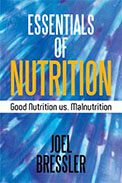
 |
Based on Bressler's forty years of professional and personal experience and study, he states, "My purpose in writing this book is to tell you the complete truth about improving the nation's health at an affordable rate." Focusing on how to rebuild malnourished bodies with good nutrition, the seasoned octogenarian is a firm believer "that most of us... are capable of improving our health by following simple instructions concerning our diet and lifestyle." Bressler's belief in teaching nutrition is to help people treat their diseases (i.e., arthritis, heart disease, Alzheimer's, cancer) "more effectively than is currently being done by using drugs and surgery alone." Over the course of four sections, Bressler explains to his audience the "who, what, why, when, and how" of the corrupted medical industry, followed by preventative measures and remedies that can keep us healthy.
Bressler's latest is a chockfull of life changing health and wellness information. The second book he has written on the topic of nutrition, the retired pharmacist's narrative features his mantra to eliminate what he calls "slow poisons" from people's lives. Bressler uses himself as a prime example in describing a healthy and disease-free lifestyle, which consists of a balanced diet devoid of "slow poisons," coupled with essential multi-mineral supplements and regular exercise (both stretch and aerobic). To name a few, Bressler's list of "slow poisons" includes caffeine, chocolate, sugar products, tobacco, and fluorides. Bressler presents a strong link between "slow poisons" and the flurry of diseases, many of which have no promising cures to date—except for the one aspect Orthodox Medicine (Bressler's label for the Western Medicine system) ignores: proper nutrition. Closing on his ideal medical design, Bressler's message rings clear: "As a Nation, we need to concentrate on the mass prevention of illness rather than continue paying the high bills of disease treatment with little success."
RECOMMENDED by the US Review